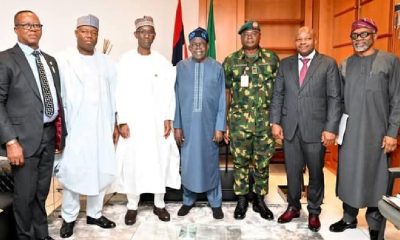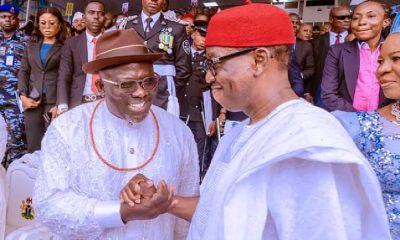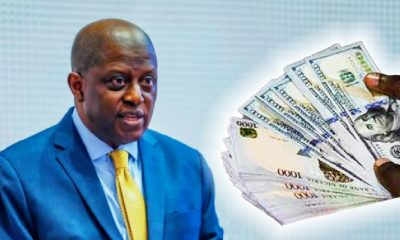Opinion
Botched 5G services and the Wi-Fi 6 gamble

By Sonny Aragba-Akpore
When fully implemented,Fifth Generation (5G) technology and services will transform the telecommunications landscape in Nigeria like nothing else before it,Isa Pantami,the immediate past Communications and Digital Economy Minister boasted on the eve of the 5G auction three years ago.He spoke with certainty and confidence.
And like in a relay race,the Chief Executive of the Nigerian Communications Commission (NCC),Umar Garba Danbatta took the baton and began the spirited advocacy building frenzied hypes around the auction.
Pantami had allegedly misled President Mohammadu Buhari, the Federal Executive Council (FEC) and everyone else in the country to believe that 5G will provide life abundance with unbelievable internet speed like lightening.
The first auction saw MTN and Mafab Communications limited (a Special Purpose Vehicle) winning two available lots at a bid price of $273.6m each.
A little over a year later,Airtel Africa got a third lot thus completing the experimental triumvirate.
But that is where the story of 5G ends so much that even the people at NCC cannot in all sincerity beat their chests to say 5G exists and will gladly list it as part of their achievements.
If it exists at all,it is better imagined because nothing is being said about it either on earth or elsewhere.
5G networks are not visible.Perhaps it is available and in use by an insignificant fraction of the population.
Even the licence beneficiaries speak about it in subdued tones and perhaps see the investment like it’s often said in local parlance as “bad market “.
Elsewhere in Africa,some countries are in the race and even though they are yet to fully achieve meaningful milestones,there are strong indications that they are coasting home to victory in this race.Not yet in Nigeria.
The India example is exemplary.Perhaps,many countries should visit India and ask them how they were able to achieve the milestones especially in a country of over 1.428 billion population.
The Indian regulator created a workable template introducing a business model that allows beneficiaries of the bid to stagger license fees payments over a period of 10 years to enable them deploy services sensing that equipment and infrastructure for 5G is not a walk in the park.
And the operators appreciate that move.
But in Nigeria,the people who midwifed 5G did it to raise money for government and allegedly made some consultants smile to the bank after collecting their well appointed commissions.
And now neither the license beneficiaries nor the people they are supposed to serve have anything to show for all the troubles.
But while consumers are in a dilemma waiting for when the services will ever come,the NCC on September 19,2024 announced in Lagos another experiment if not a gamble.
It is introducing Wireless Fidelity (Wi-Fi 6) which they claim will bridge the digital divide whereby the speed of internet will be “amazing.”
Globally,Wi-Fi 6 is not new.It has taken root in parts of the world including the United States,(USA),South Korea,Canada,U.K and many others.
The International Telecommunications Union (ITU) created workable templates for it some of which the Federal Communications Commission (FCC) of the USA had adopted with a home grown modification.
So if Nigeria adopts it,the question is how prepared is the regulator in Abuja to manage it for the benefit of consumers.?Will it be another hype like we saw in 5G?
Speeches and more speeches were made on September 19,2024 in Lagos on the subject with a number of participants having their reservations if not misgivings.
When the NCC conducted the 5G
auction of two lots of 100 MHz slots of 3.5 GHz band for the deployment of 5G networks in
Nigeria it was done with funfare likened to bazaar of sorts.
Three companies participated in the auction process and the bidding commenced at $199.37m, as against the reserve price of $197.4m (75 billion naira) set by the NCC
After 11 rounds of bidding, the auction ended at $273.6m for each available lot with MTN Nigeria Communications Plc (MTN) and Mafab Communications Limited (Mafab) emerging as preferred bidders.
And the preferred bidders were
expected to pay the winning bid price, less the Intention-to-Bid Deposit, no later than February 24,2022.
MTN was to pay an additional sum of $15.9m to be assigned the preferred Lot One (3500-3600
MHz), while Mafab was assigned Lot Two (3700-3800 MHz), at no extra cost.
In addition, Mafab was required to acquire a Unified Access Service License, which is the operational license for the frequency spectrum at an additional fee of N374.6m (approximately $905,000 then).
The Information Memorandum (IM) provided for a validity period of 10 years for the awarded
spectrum and further requires licensees to roll out service in at least one state in each geo-political zone within the first two years from the effective date of the license. Further roll out was expected in six additional states in the 3rd and 5th years.
The technology is expected to have been fully deployed nationwide between the 6th and 10th year of the award of the license. Roll out in each state was expected to be a minimum of five sites per state.
The Federal Government earned $820.8 million from the auctioning of the 5G licence processes.
Pantami who said it was a game changer told President Muhammadu Buhari administration then that 5G will make a world of difference.
According to Pantami , in addition to the revenue generated from the 5G spectrum, revenue is being generated from other spectrum fees. “For example, in 2020, N26,428,642,451.61 was generated as spectrum fees.”
“MTN, Mafab and Airtel all have participated in the auction process and each obtained a lot of 100 MHz from the 3.5GHz spectrum after successfully participating in the auction process.The story has not gone beyond that.
Now another experiment,the Wi fi 6 which ITU says could be accessed on the 5925–7125 Megahertz (MHZ) band, and is designed to deliver optimized performance for next-generation use cases.
As with any wireless technology, Wi‑Fi depends on access to radio frequency spectrum. But a lack of spectrum threatens future Wi‑Fi performance and functionality.
“ Policymakers, recognizing this, are expanding Wi‑Fi spectrum access with a focus on the 5925–7125 megahertz (MHz), or 6 gigahertz (GHz), frequency band. Opening this band to Wi‑Fi will enable a wide range of new use cases,”ITU submits.
These — combined with expanded broadband access via fibre or satellite — promise to deliver versatile and extremely affordable connectivity. This makes Wi‑Fi an ideal force multiplier for connectivity.
ITU explains that the case for allowing Wi‑Fi services in the 5925–7125 MHz band is clear and compelling, with 6 GHz Wi‑Fi already delivering real socio-economic benefits in many countries.
“The diverse and growing product ecosystem for 6 GHz Wi‑Fi fits perfectly with broadband objectives in developed and developing countries — and without disrupting incumbent operations.”
Granting Wi‑Fi access to the 5925–7125 MHz band would be the best way to maximize the socio-economic value of this spectrum. Conversely, 6 GHz IMT “vaporware” looks far from achieving commercial feasibility, particularly given a total absence of equipment at this stage.”
The ITU says in Real-World Speed and practical real-world scenarios, WiFi 5 typically provides speeds ranging from 300 Megabit per second (Mbps) to 1.7 Gbps. “On the other hand, WiFi 6 can provide speeds ranging from 600 Mbps to 4.8 Gbps or more in real-world usage.”
According to ITU,”Wi-Fi 6 is the latest standard from the Wi-Fi Alliance based on the 802.11ax protocol, and provides critical capabilities needed for next generation enterprise requirements. “
Wi-Fi 6, also known as 802.11ax, is the latest generation and standard for wireless networking that replaces the 802.11ac, or Wi-Fi 5, standard. Prior to the release of Wi-Fi 6, Wi-Fi standards were identified by version numbers ranging from 802.11b to 802.11ac.
Wifi 6 is capable of connecting no fewer than eight devices simultaneously and creates a seamless connection to these devices at minimal costs.
Despite the beauty and robustness of Wi-Fi 6,there are drawbacks .
“If iPhone is older than the iPhone 11, it can’t use Wi-Fi 6. But there are other ways to make your phone’s internet run as fast as possible.
An older laptop won’t be able to take advantage of Wi-Fi 6 either. A Wi-Fi 6 router will still work with older devices, you just won’t enjoy all the benefits listed above.”ITU submits.
When he spoke at the NCC Yearly Stakeholders Consultative Forum on Emerging Technologies in Lagos last week,Executive Commissioner (Technical Services) Abraham Oshadami told his audience that “Wi-Fi-6 represents a significant leap in wireless technology. It offers an opportunity to support more devices with faster speed and greater reliability.” adding that “this is particularly strategic in a world increasingly dominated by the Internet of Things (IoT), where everything from smart homes to advanced industrial systems depends on robust wireless connectivity.”
Oshadami said that the deployment in the lower 6GHz band is not just about faster internet; “it’s about enabling the next generation of technological innovation and economic growth.”
Oshadami,with a measure of confidence went memory lane saying “throughout the last ITU Radiocommunications (ITU-R) Sector study cycle, experts discussed, amongst many other things, the use of Wi-Fi in the lower 6GHz Spectrum Band and made recommendations that were subsequently finalized at the 2023 World Radiocommunications Conference (WRC-23) where the 6GHz Spectrum Band was allocated for Wi-Fi and IMT applications.”
He said prior to the 2023 World Radiocommunications Conference, African Telecommunications Union (ATU) had already concluded its decision on the 6GHz Spectrum Band and recommended that administrations in Africa adopt the lower 6GHz for Wi-Fi-6 applications. “This decision was taken to WRC-23 and at the end of the day, Africa came out victorious. Having played a vital role in securing this spectrum for Wi-Fi deployment, it has become imperative to open the frequency for deployment of Wi-Fi Application.
However, as a world class organisation and in the spirit of participatory regulation, we cannot sit down in our offices and make unilateral decisions without the input of our stakeholders” hence the consultative forum on emerging technologies.
Although it is not clear when services on Wi-Fi 6 will flag off and modalities for licences to be issued or whether it will be an open market for all comers,there are strong indications that licensing may be very flexible especially with regards to assignment of the frequency to power the system.
But the question that is on the lips of service providers and the enthusiastic consumers is whether this will not go the way of 5G?
Time will tell.
Opinion
CBN under Cardoso and $6.83 Billion balance of payments surplus in 2024 that signals economic resurgence

By Ibrahim Modibbo
Since his appointment as the Governor of the Central Bank of Nigeria, in October 5, 2023, Olayemi Cardoso has continue to bring on board wide-range of macroeconomic reforms, stronger trade performance, and renewed investor confidence in Nigeria’s economy, that were aimed at putting the country back to its economic footing, as a strong economy that is second to none in Africa.
As part of the ongoing reforms, the Central Bank of Nigeria recently announced a Balance of Payments (BOP) surplus of $6.83 billion for the 2024 financial year, marking a decisive turnaround from deficits of $3.34 billion in 2023 and $3.32 billion in 2022, according to a press statement from Mrs Sidi-Ali, Hakama, the Ag. Director, Corporate Communications of the apex bank.
CBN says “the current and capital account recorded a surplus of $17.22 billion in 2024, underpinned by a goods trade surplus of $13.17 billion. Petroleum imports declined by 23.2% to $14.06 billion, while non-oil imports fell by 12.6% to $25.74 billion. On the export side, gas exports rose by 48.3% to $8.66 billion, and non-oil exports increased by 24.6% to $7.46 billion.”
While “remittance inflows remained resilient, with personal remittances rising by 8.9% to $20.93 billion. International Money Transfer Operator (IMTO) inflows surged by 43.5% to $4.73 billion, up from $3.30 billion in 2023, reflecting stronger engagement from the Nigerian diaspora. Official development assistance also rose by 6.2% to $3.37 billion,” the statement added.
Nigeria recorded a net acquisition of financial assets totalling $12.12 billion. Portfolio Investment inflows more than doubled, increasing by 106.5% to $13.35 billion, while resident foreign currency holdings grew by $5.41 billion, indicating stronger confidence in domestic economic stability. Although foreign direct investment fell by 42.3% to $1.08 billion, the overall financial account posted notable gains.
The country’s external reserves increased by $6.0 billion to $40.19 billion by year-end 2024, bolstering its external buffer.
Notably, net errors and omissions narrowed significantly by 79.5% to negative $5.10 billion in 2024, down from $24.90 billion in 2023, reflecting substantial improvements in data availability and capture. This represents a major advance in data accuracy, transparency, and overall reporting integrity.
The 2024 BOP surplus highlights the effectiveness of Nigeria’s ongoing reform agenda. The liberalisation and unification of the foreign exchange market, a disciplined monetary policy approach to managing inflation and stabilising the naira, and coordinated fiscal and monetary measures have all contributed to enhanced competitiveness and investor sentiment.
“The positive turnaround in our external finances is evidence of effective policy implementation and our unwavering commitment to macroeconomic stability,” said the Governor of the Central Bank of Nigeria. “This surplus marks an important step forward for Nigeria’s economy, benefiting investors, businesses, and everyday Nigerians alike,” the statement further noted.
Other notable indicators to building strong economy by this policy include but not limited to a stronger trade performance, particularly in the current and capital accounts, with a surplus of $17.22 billion in 2024, has contributed to the balance of payments surplus. A goods trade surplus of $13.17 billion that will further strengthens the positive trend. The decline in petroleum and non-oil imports also contributes to a more favorable trade balance.
It will noteworthy to note that the CBN’s reforms have increased investor confidence, leading to higher foreign portfolio investment inflows. Portfolio investment inflows more than doubled in 2024, reaching $13.35 billion. This influx of capital indicates a stronger belief in the stability and growth prospects of the Nigerian economy.
The apex bank’s disciplined monetary policy and FX market reforms on the other hand are aimed at managing inflation and stabilizing the Naira, has contributed to a more stable financial system.
The liberalization and unification of the foreign exchange market have led to greater transparency and reduced distortions in the market.
The implementation of an Electronic Foreign Exchange Matching System (EFEMS) further enhances transparency and efficiency in the FX market.
The reforms, including the unification of the exchange rate, have improved Nigeria’s competitiveness and attracted more foreign investment. Testament to this is the clearing of a $7 billion forex backlog which has also boosted the country’s image with foreign investors.
Also, the significant improvements in data availability and capture have led to a marked reduction in net errors and omissions in the balance of payments data. This enhanced data integrity provides a more accurate picture of the country’s economic performance and builds trust with stakeholders.
In conclusion, the combination of strong trade performance, renewed investor confidence, disciplined monetary policy, and improved data integrity, all facilitated by the CBN’s wide-ranging reforms, are key indicators of Nigeria’s economic resurgence. These developments demonstrate the positive impact of the reforms on the nation’s external finances and overall economic stability.
Dr Moddibo, a public analyst, wrote in from Abuja
Opinion
CBN leads financial dialogue with JP Morgan, NGX, others, in pre-spring meetings Forum

By Dr. Ibrahim Modibbo
In anticipation of the International Monetary Fund (IMF) and World Bank Group (WBG) Spring meetings which commenced on Monday, April 21, 2025, the Central Bank of Nigeria (CBN) partnered with J.P. Morgan, the Nigerian Exchange Group (NGX) and Africa Private Capital Association (AVCA) to host a high-profile global forum at Nasdaq MarketSite in New York on Thursday, April 17, 2025, according to press statement by Dr Ibrahim Moddibo.
The forum, titled “The Nigeria Investment Agenda: Pathways for Growth & Global Partnerships,” convened global investors, diaspora leaders, and senior financial stakeholders to examine Nigeria’s macroeconomic prospects and ongoing reform progress.During his commanding address, Governor Olayemi Cardoso outlined his comprehensive reform strategy encompassing monetary tightening, foreign exchange market transparency, and enhanced financial governance.
He emphasized that these initiatives are establishing the foundation for sustainable macroeconomic stability and heralding a new era of transparency and confidence.Governor Cardoso reaffirmed the CBN’s unwavering commitment to rebuilding credibility through orthodox monetary policy, transparency, and consistency.
“We inherited a crisis of confidence but chose a different path. We’re not turning back,” he stated decisively.In a powerful fireside chat between the Governor and Nobel Prize-winning economist Dr. James Robinson, Reverend Richard L. Pearson Professor at the University of Chicago, Governor Cardoso elaborated on his vision to reestablish the CBN as a credible, trusted institution – rooted in domestic excellence and respected internationally.Mr. Muhammad Sani Abdullahi, Deputy Governor for Economic Policy at the CBN, delivered a macroeconomic update highlighting sharp increases in foreign exchange turnover, emerging signs of disinflation, and strengthening external reserves. “With a market-determined exchange rate and a transparent, rules-based policy framework, confidence is gradually being restored in Nigeria’s economy,” he noted.
Welcoming participants to the forum, Dr. Nkiru Balonwu, Adviser to the CBN Governor on Stakeholder Engagement and Strategic Communication, framed the forum as a key moment in the Bank’s broader engagement strategy. “Today is more than a conversation,” she noted.
It’s about opening the books on the CBN’s transformation story under Governor Cardoso – sharing the facts, interrogating the progress, and looking ahead together at what more can be done to build sustainable partnerships and unlock long-term capital,” she explained.
Another key highlight of the event was the panel discussion entitled “Repricing Nigeria: Assessing the Scope for Sustained Change.” Moderated by Gavin Serkin, Founder of New Markets Media & Intelligence, the panel featured global financial luminaries: Joyce Chang, Chair of Global Research at JPMorgan Chase; Jason Rekate, Global Co-Head of Corporate Banking at Citi; Razia Khan, Chief Economist for Africa & Middle East at Standard Chartered; and Ahmad Zuaiter, Co-Founder & CIO of Jadara Capital Partners. Each panelist provided expert perspectives on Nigeria’s investment landscape, noting renewed international interest driven by improved fundamentals, strengthened governance, and clearer policy direction.
The CBN Board and Monetary Policy Committee were represented by US-based diaspora members Mr. Robert Agbede, Prof. Melvin Ayogu, and Dr. Aloysius Ordu, underscoring the Bank’s global engagement and commitment to leveraging Nigerian talent worldwide. Temi Popoola, Group CEO of NGX, moderated the Q&A session, while Dr. Olubukola Akinniyi Akinwunmi, Director of Banking Supervision at CBN, delivered the closing remarks.The forum focused on substantive discussions and future prospects: engaging critical voices, evaluating progress, and identifying requirements for building lasting partnerships and attracting long-term capital. Central to this endeavor is a clear objective: reestablishing the CBN as a credible, trusted institution respected globally and dedicated to excellence at home.
Dr. Ibrahim Modibbo, a public affairs analyst writes from Abuja.
Opinion
Instagram , WhatsApp troubled by antitrust laws

By Sonny Aragba-Akpore
While we are yet to grapple with the fate of Tik Tok which President Donald Trump had asked its parent company Byte Dance of China to divest from it’s American operations or be banned, Meta Group, owners of Instagram and WhatsApp, is troubled over antitrust concerns.
The U.S. Federal Trade Commission (FTC) has taken the group to court over anti competition issues.
Specifically, the FTC wants Meta to divest from its two biggest companies in an antitrust trial that could redefine the future of social media.
And so Meta’s world is troubled as Mark Zuckerberg’s company could be forced to sell Instagram and WhatsApp if it loses the lawsuit that has just begun in the U.S.
The FTC has accused Zuckerberg’s company of having bought both platforms to eliminate competition and maintain a monopoly on social media.
If the court rules against them, it would be a historic blow to the tech giant.
Zuckerberg acquired Instagram in 2012, and then, two years later,(2014) completed his trio by buying WhatsApp.
Facebook is the third leg of the trio and this easily makes the group the largest tech owner in the world.
Although these acquisitions were approved by the FTC itself at that time ,but now this lawsuit seeks to reverse that approval, arguing that the purchase was not for innovation but to “neutralize” emerging rivals like Instagram which was acquired in 2012 and thus take control of the entire market.
The FTC claims that Meta has used its financial muscle to block competition, buying up emerging apps instead of competing with them, and it has been doing this since 2008! Everything is based on 2012 emails where Zuckerberg had expressed concern about Instagram’s rapid growth compared to Facebook’s performance (which was his only app at the time). In those emails, Zuckerberg admitted it was better to buy than to compete. And so he did, acquiring the app years later.
“On the other hand, he also bought WhatsApp, and of course that reinforces the FTC’s accusation. Meta strengthened its control over the digital system, keeping these apps as separate platforms but under the same power structure” analysts reason.
Meta has not denied the purchases, even though it rejects having acted in an anti-competitive way, calling the case a “weak lawsuit that ignores reality,” since they believe they face strong competition from platforms like TikTok, YouTube or X among many other apps.
During the trial, Zuckerberg claimed he bought Instagram for its camera technology, not because the social network was on the rise, but the 2012 messages don’t seem to support that statement very well.
In the likelihood that FTC wins this case, Meta could be forced to sell Instagram, WhatsApp, or both. This wouldn’t necessarily mean an immediate change for users, but it would shift the balance in the digital market, according to experts.
Digital sociologists think that Meta would make it easier to regulate social networks individually by the FTC.
One of the major implications will be on things like content moderation, privacy, or the use of personal data.
“If it gets split, it would be easier for lawmakers, ensuring proper service to users” digital sociologists admit.
There are however fears of who buys if it gets to that .
For instance If a controversial figure like Elon Musk or an investment fund takes control of Instagram, like what happened with Twitter (now X), it’s possible that many users would leave in large numbers for new alternatives that may emerge, like BlueSky.
“But if it falls into the hands of a discreet company, without major visible changes, it’s likely that most people will keep using it as they always have.”
Although Meta does not reveal exactly how much it earns from each app, it is estimated that Instagram generates around $37 million a year, surpassing Facebook’s revenue according to analysts.
“So of course, Zuckerberg’s eagerness to get out of this case is clear: they can’t afford to lose that income because it would be a catastrophe for Meta” another analyst submits.
The expectations are dicey because the court’s decision will not only affect Meta, but could also open the door to more lawsuits against other big platforms for similar monopoly practices. And at a time when the control of social networks is more questioned than ever, this case could define the future of the digital system in terms of free choice and regulations.
Instagram and WhatsApp which were acquired over a decade ago have become social powerhouses and easily the biggest platforms in that genre.
This looming antitrust trial will be the first big test of President Trump’s Federal Trade Commission’s ability to challenge Big Tech.
The lawsuit was first filed against Meta — then called Facebook — in 2020, during Trump’s first term. It claims the company bought Instagram and WhatsApp to squash competition and establish an illegal monopoly in the social media market.
FTC contends that Meta has maintained a monopoly by pursuing CEO Zuckerberg’s strategy, “expressed in 2008: ‘It is better to buy than compete.’ True to that maxim, Facebook has systematically tracked potential rivals and acquired companies that it viewed as serious competitive threats.”
U.S. antitrust laws are enforced by both the FTC’s Bureau of Competition and the Antitrust Division of the Department of Justice. The agencies consult before opening any investigation. The Antitrust Division handles all criminal antitrust enforcement.
The FTC,s Bureau of Competition enforces the nation’s antitrust laws, which form the foundation of a free market economy.
The antitrust laws promote the interests of consumers; they support unfettered markets and result in lower prices and more choices.
The Federal Trade Commission Act and the Clayton Act, both passed by Congress in 1914, give the Commission authority to enforce the antitrust laws.
These laws prohibit anticompetitive mergers and business practices that seek to prevent hard-driving competition, such as monopolistic conduct, attempts to monopolize, and conspiracies in restraint of trade.
The Bureau of Competition investigates potential law violations and seeks legal remedies in federal court or before the FTC’s administrative law judges. The Bureau also serves as a resource for policy makers on competition issues, and works closely with foreign competition agencies to promote sound and consistent outcomes in the international arena.
WhatsApp (officially WhatsApp Messenger) is an American social media, instant messaging (IM), and voice-over-IP (VoIP) service owned by technology conglomerate Meta. It allows users to send text, voice messages and video messages, make voice and video calls, and share images, documents, user locations, and other content.
WhatsApp’s client application runs on mobile devices, and can be accessed from computers.
The service requires a cellular mobile telephone number to sign up.
In January 2018, WhatsApp released a standalone business app called WhatsApp Business which can communicate with the standard WhatsApp client.
The service was created by WhatsApp Inc. of Mountain View, California, which was acquired by Facebook in February 2014 for approximately US$19.3 billion.
It became the world’s most popular messaging application by 2015,and had more than two billion users worldwide by February 2020,confirmed four years later by 200 million new registrations per month.
By 2016, it had become the primary means of Internet communication in regions including the Americas, the Indian subcontinent, and large parts of Europe and Africa.
Instagram is an American photo and short-form video sharing social networking service owned by Meta Platforms. It allows users to upload media that can be edited with filters, be organized by hashtags, and be associated with a location via geographical tagging.
Posts can be shared publicly or with preapproved followers. Users can browse other users’ content by tags and locations, view trending content, like photos, and follow other users to add their content to a personal feed.
A Meta-operated image-centric social media platform, it is available on iOS, Android, Windows 10, and the web. Users can take photos and edit them using built-in filters and other tools, then share them on other social media platforms like Facebook.
It supports 32 languages including English, Hindi, Spanish, French, Korean, and Japanese.
Instagram was originally distinguished by allowing content to be framed only in a square aspect ratio of 640 pixels to match the display width of the iPhone at the time.
In 2015, this restriction was eased with an increase to 1080 pixels. It also added messaging features, the ability to include multiple images or videos in a single post, and a Stories feature—similar to its main competitor, Snapchat, which allowed users to post their content to a sequential feed, with each post accessible to others for 24 hours.
As of January 2019, Stories were used by 500 million people daily.
Instagram was launched for iOS in October 2010 by Kevin Systrom and Mike Krieger. It rapidly gained popularity, reaching one million registered users in two months, 10 million in a year, and one billion in June 2018.
In April 2012, Facebook acquired the service for approximately US$1 billion in cash and stock. The Android version of Instagram was released in April 2012, followed by a feature-limited desktop interface in November 2012, a Fire OS app in June 2014, and an app for Windows 10 in October 2016.
Although often admired for its success and influence, Instagram has also been criticized for negatively affecting teens’ mental health, its policy and interface changes, its alleged censorship, and illegal and inappropriate content uploaded by users.
-

 News23 hours ago
News23 hours agoINSECURITY! Enough is enough, Tinubu tells security chiefs, NSA
-

 News23 hours ago
News23 hours agoJust in: Air Peace suspends all scheduled flights nationwide
-

 News22 hours ago
News22 hours agoINEC moves to legalise voting without PVC
-

 Economy14 hours ago
Economy14 hours agoSEE current exchange rate of the Dollar to Naira
-

 News18 hours ago
News18 hours agoJust in: PDP can never die over gale of defection -Hon Teejay Yusuf insists
-

 Politics23 hours ago
Politics23 hours agoFCT minister, Wike, Uzodinma hail Okowa/Oborevwori defection to APC
-

 News11 hours ago
News11 hours agoJUST IN: Rivers Sole Administrator Ibas Shun Reps Panel
-

 Opinion20 hours ago
Opinion20 hours agoCBN under Cardoso and $6.83 Billion balance of payments surplus in 2024 that signals economic resurgence




